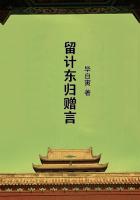It may have been slower with some, quicker with others. Some tribes may have used shorter, others longer words or cries: they may have been more or less inclined to agglutinate or to decompose them: they may have modified them by the use of prefixes, suffixes, infixes; by the lengthening and strengthening of vowels or by the shortening and weakening of them, by the condensation or rarefaction of consonants. But who gave to language these primeval laws; or why one race has triliteral, another biliteral roots; or why in some members of a group of languages b becomes p, or d, t, or ch, k; or why two languages resemble one another in certain parts of their structure and differ in others; or why in one language there is a greater development of vowels, in another of consonants, and the like--are questions of which we only 'entertain conjecture.' We must remember the length of time that has elapsed since man first walked upon the earth, and that in this vast but unknown period every variety of language may have been in process of formation and decay, many times over.
(Compare Plato, Laws):--'ATHENIAN STRANGER: And what then is to be regarded as the origin of government? Will not a man be able to judge best from a point of view in which he may behold the progress of states and their transitions to good and evil?
CLEINIAS: What do you mean?
ATHENIAN STRANGER: I mean that he might watch them from the point of view of time, and observe the changes which take place in them during infinite ages.
CLEINIAS: How so?
ATHENIAN STRANGER: Why, do you think that you can reckon the time which has elapsed since cities first existed and men were citizens of them?
CLEINIAS: Hardly.
ATHENIAN STRANGER: But you are quite sure that it must be vast and incalculable?
CLEINIAS: No doubt.
ATHENIAN STRANGER: And have there not been thousands and thousands of cities which have come into being and perished during this period? And has not every place had endless forms of government, and been sometimes rising, and at other times falling, and again improving or waning?'
Aristot. Metaph.:--'And if a person should conceive the tales of mythology to mean only that men thought the gods to be the first essences of things, he would deem the reflection to have been inspired and would consider that, whereas probably every art and part of wisdom had been DISCOVERED AND LOST MANY TIMES OVER, such notions were but a remnant of the past which has survived to our day.')
It can hardly be supposed that any traces of an original language still survive, any more than of the first huts or buildings which were constructed by man. Nor are we at all certain of the relation, if any, in which the greater families of languages stand to each other. The influence of individuals must always have been a disturbing element. Like great writers in later times, there may have been many a barbaric genius who taught the men of his tribe to sing or speak, showing them by example how to continue or divide their words, charming their souls with rhythm and accent and intonation, finding in familiar objects the expression of their confused fancies--to whom the whole of language might in truth be said to be a figure of speech. One person may have introduced a new custom into the formation or pronunciation of a word; he may have been imitated by others, and the custom, or form, or accent, or quantity, or rhyme which he introduced in a single word may have become the type on which many other words or inflexions of words were framed, and may have quickly ran through a whole language. For like the other gifts which nature has bestowed upon man, that of speech has been conveyed to him through the medium, not of the many, but of the few, who were his 'law-givers'--'the legislator with the dialectician standing on his right hand,' in Plato's striking image, who formed the manners of men and gave them customs, whose voice and look and behaviour, whose gesticulations and other peculiarities were instinctively imitated by them,--the 'king of men' who was their priest, almost their God...But these are conjectures only: so little do we know of the origin of language that the real scholar is indisposed to touch the subject at all.
(2) There are other errors besides the figment of a primitive or original language which it is time to leave behind us. We no longer divide languages into synthetical and analytical, or suppose similarity of structure to be the safe or only guide to the affinities of them. We do not confuse the parts of speech with the categories of Logic. Nor do we conceive languages any more than civilisations to be in a state of dissolution; they do not easily pass away, but are far more tenacious of life than the tribes by whom they are spoken. 'Where two or three are gathered together,' they survive. As in the human frame, as in the state, there is a principle of renovation as well as of decay which is at work in all of them. Neither do we suppose them to be invented by the wit of man.
With few exceptions, e.g. technical words or words newly imported from a foreign language, and the like, in which art has imitated nature, 'words are not made but grow.' Nor do we attribute to them a supernatural origin.
The law which regulates them is like the law which governs the circulation of the blood, or the rising of the sap in trees; the action of it is uniform, but the result, which appears in the superficial forms of men and animals or in the leaves of trees, is an endless profusion and variety.
The laws of vegetation are invariable, but no two plants, no two leaves of the forest are precisely the same. The laws of language are invariable, but no two languages are alike, no two words have exactly the same meaning.
No two sounds are exactly of the same quality, or give precisely the same impression.
It would be well if there were a similar consensus about some other points which appear to be still in dispute. Is language conscious or unconscious?















